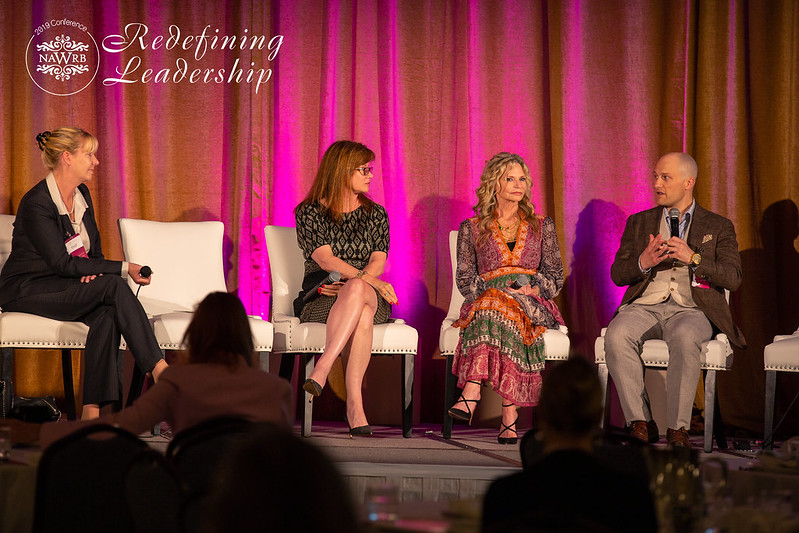Watch a never-before-seen video of the “Family Office” panel at the 2019 NAWRB Conference. Panelists Wendy Craft, Chief of Staff at Fulcrum Equities, LLC; Cynthia French Blanchard, President of Anthem Vault, Inc., AnthemGold, Inc., and Hercules, SEZC; Cindy Brittain, International Private Client Tax Partner at Katten Muchin Rosenman LLP; and Brian DeLucia, Managing Partner of Arrivato LLC, discussed the latest developments and trends in Family Offices, including intergenerational wealth transfer and tax issues. Watch the video below!
A family office is a family controlled investment group that families of significant wealth can have to manage their wealth and assets. Family offices are attractive to investors with business leadership inclinations because the model gives them complete control with little regulatory oversight.
To begin, the panelists discussed how recent changes to the tax codes by the Trump Administration has affected the Family Office. Cindy Brittain stated that one can avoid California’s income tax with proper planning. In some states, she shared that there is a trend of families setting up their own private trust company. Although many family offices have made a hub in New York City, Cindy tells us that “Tennessee wants to be at the forefront of family offices.”
Cindy also touched upon the pressing issues of intergenerational wealth transfer. As mentioned in Volume VI:Family Offices of the 2019 NAWRB Women Housing Ecosystem Report (WHER), intergenerational wealth transfer is something that all family offices should prepare for to ensure wealth sustainability. Seventy percent of family offices predict that the next generation will take control in the next 10 to 15 years.
This is the time for family offices to assess what the next generation needs and establish programs that will help the next generation with future financial planning, as well as estate and tax planning solutions. Cindy shares that there is some unwillingness among older generations to begin the transfer process. As she stated, “older generations don’t want to transfer; they want to die in the chair,” in what she calls the “Prince Charles Syndrome.”
Only 20 percent of businesses survive the first succession, so it is important that family offices prepare for the upcoming intergenerational wealth transfer to avoid any potential pitfalls. Another challenge that family offices should be prepared for is the infamous ‘rule of 92,’ which states that 92 percent of a family’s wealth is lost by the third generation. This is an obstacle even for those who have successfully implemented their first succession.
Cynthia French Blanchard noted that her family office is being proactive in preparing for intergenerational wealth transfer by including the younger generation in the daily operation of the company. “We hire a lot of nieces and nephews to be a part of the company to have the foundation of ownership,” she said.
An important aspect of succession planning is educating the next generation about the operations of the family office. Part of that education should include hands-on experience in the family offices so that they can learn the in’s and out’s of the organization.’ This often includes business operations, investment strategy, asset allocations, succession planning, philanthropy and other responsibilities related to managing great amounts of money.
The panelists agreed on the importance of allowing children to have a voice and participate in meetings. This might mean giving them a say in what the family mission will be moving forward. It all comes down to true communication and creating an alignment of interest throughout the family.
Moderator Wendy Craft introduced an interesting topic of whether or not family offices have trouble bringing in innovative ideas since business is usually kept in the family. As she asked, “Is our family becoming incestuous because we don’t have new ideas coming in?”
Brian DeLucia answered that “Governance in a family is very important. Some have their children get hired by other companies to build their skills and knowledge, and to increase exposure to what other family offices are doing.” This is one way that family offices can bring fresh perspectives into their organization.
As the younger generation brings innovative ideas into the family office, the older generation helps them gain opportunities in areas that spark their interest. This creates a symbiotic relationship that benefits everyone. As Brian explained, “the children might have other passions or interests, so you have to utilize your whole ecosystem to help them gain exposure and experience in what they’re interested in.”
As a result, he states that “children are learning how to speak or think in a business sense.” Overall, it’s critical for first generations in a family office to understand the younger generations’ passions and motivations. In return, the younger generations will gain an interest in what the family is doing.Reaching the younger generation through philanthropy was the trend, but now they are becoming interested in cryptocurrency, as Cynthia has seen from her own personal experience.
One of the most pivotal tools that every family office needs for continued growth and success is effective communication, which is why teaching communication among family members is key. Cindy shared that it’s sometimes difficult for members of a family office to communicate their wants, but they fail to realize that they share common goals and values with each other. Learning that they have a common thread might be a scary prospect to them, but this knowledge can lead to a stronger bond, especially between the first generation and those that follow.
Family offices can learn how to improve their communication and deal with difficult decisions with the assistance of an open-minded advisor who, as Cindy stated, “can be a piece in bridging a plan.” Therapists can also be helpful in succession planning, as well, as it can bring up uncomfortable feelings regarding mortality. Overall, a successful succession plan will address economic, fiscal and human issues likely to appear in the transition, and family offices benefit from seeking counsel from key advisors, industry experts and thought leaders, colleagues and other family members.

 Login
Login

